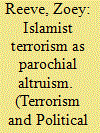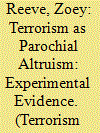|
|
|
Sort Order |
|
|
|
Items / Page
|
|
|
|
|
|
|
| Srl | Item |
| 1 |
ID:
183026


|
|
|
|
|
| Summary/Abstract |
Despite calls from governments to clamp down on violent extremist material in the online sphere, in the name of preventing radicalisation and therefore terrorism research investigating how people engage with extremist material online is surprisingly scarce. The current paper addresses this gap in knowledge with an online experiment. A fictional extremist webpage was designed and (student) participants chose how to engage with it. . A mortality salience prime (being primed to think of death) was also included. Mortality salience did not influence engagement with the material but the material itself may have led to disidentification with the ingroup. Whilst interaction with the material was fairly low, those that did engage tended to indicate preference for hierarchy and dominance in society, stronger identification with the ingroup, higher levels of radicalism, and outgroup hostility. More engagement with the online extremist material was also associated with increased likelihood of explicitly supporting the extremist group. These findings show that indoctrination, socialisation, and ideology are not necessarily required for individuals to engage attitudinally or behaviourally with extremist material. This study is not conducted on the dependent variable, therefore shedding light on individuals who do not engage with extremist material.
|
|
|
|
|
|
|
|
|
|
|
|
|
|
|
|
| 2 |
ID:
172169


|
|
|
|
|
| Summary/Abstract |
An evolutionary approach is used to explain how certain universal cognitive mechanisms (parochial altruism) underlie engagement and involvement in Islamist terrorism. Parochial altruism is the tendency to perceive and behave in ways that favour ingroups and disfavour outgroups in light of particular intergroup cues, whilst incurring some kind of personal cost to effect that bias. The parochial altruism mechanism influences how ingroups and outgroups are perceived (i.e., as threatened or threatening) and responded to. Experience of certain situations and/or dispositions (i.e., priming contexts of disease, and harm to the ingroup) make parochial altruistic responses more likely. It is argued that Islamist terrorist grievances can be considered as perceptions of evolutionarily relevant threats, whilst terrorism itself is an example of parochial altruistic behaviour. It is further proposed that features associated with engagement in terrorism (including exposure to ideology, propaganda, socialisation, etc.) enhance and guide parochial altruism, that is, perceptions of intergroup threat, and violent responses to it.
|
|
|
|
|
|
|
|
|
|
|
|
|
|
|
|
| 3 |
ID:
191479


|
|
|
|
|
| Summary/Abstract |
U.K. Metropolitan Police Counter-Terrorism Internet Referral Unit (CTIRU) Case Officers (COs) are tasked with identifying, and facilitating the removal of material that breaches the Terrorism Act 2006. COs are extensively and repeatedly exposed to material deemed illegal and harmful (including but not restricted to graphic terrorist and non-terrorist material). However, there is little research on the impact of this work, or how COs manage and mitigate the risks of their roles. Semi-structured interviews reveal the adaptive coping mechanisms that promote good perceived health and wellbeing in CTIRU, as well as areas of concern and improvement.
|
|
|
|
|
|
|
|
|
|
|
|
|
|
|
|
| 4 |
ID:
183028


|
|
|
|
|
| Summary/Abstract |
Drawing on the evolutionary approach, this paper proposes that certain universal cognitive mechanisms (parochial altruism) underlie engagement and involvement in terrorism. Parochial altruism is the tendency to perceive and behave in ways that favour ingroups and disfavour outgroups in light of particular intergroup cues, whilst incurring some kind of personal cost in order to effect that bias. New data is generated by implementing an experiment and using a student sample to investigate certain features of parochial altruism. Findings indicate that sensitivity to parochial altruism varies across individuals, according to sex, group size, and feelings of vulnerability. Some individuals are more sensitive to perceiving and responding to threatening outgroups, which is relevant to the radicalisation process. It is proposed that in certain conditions, such as the presence of radicalisation risk factors, those most sensitive to parochial altruism may be more open to perceptions of threat to the ingroup, extremist ideology, and more likely to engage in violent actions than others.
|
|
|
|
|
|
|
|
|
|
|
|
|
|
|
|
|
|
|
|
|